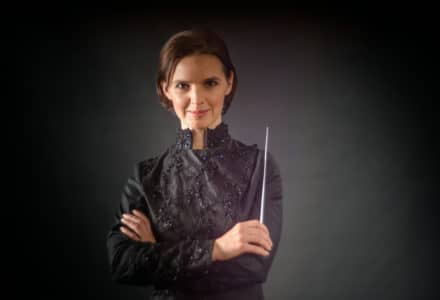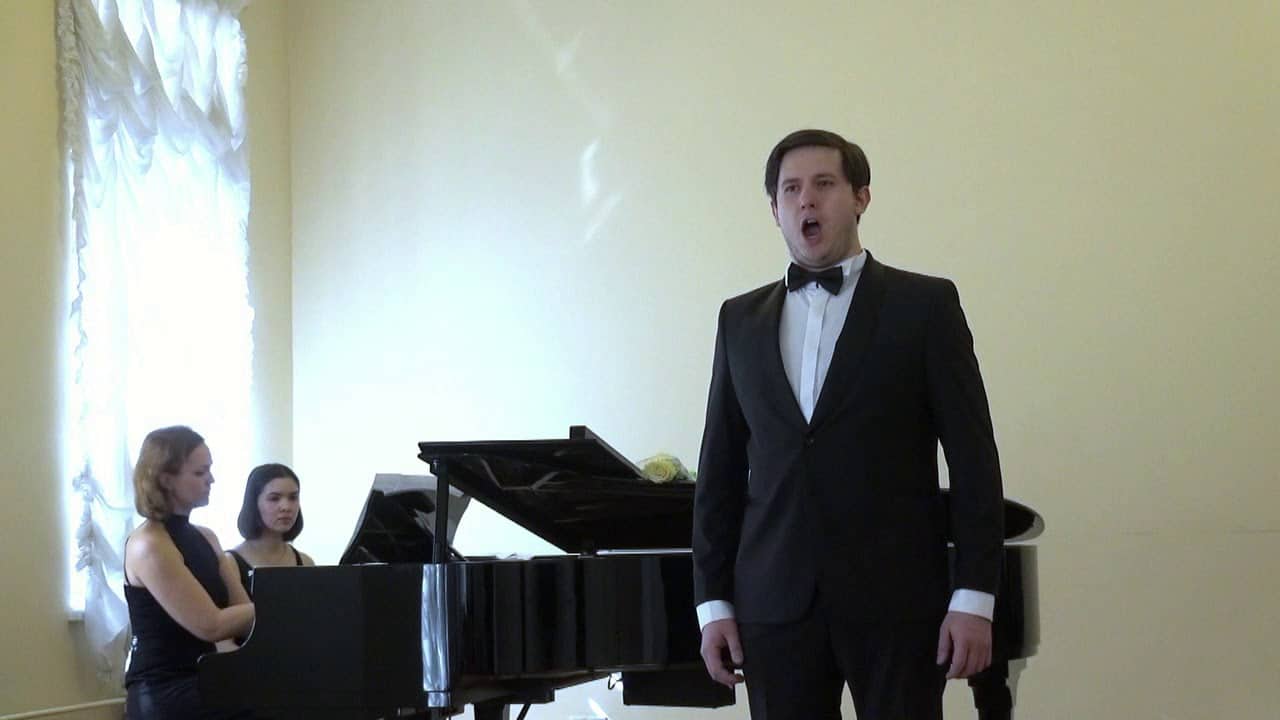US and Germany are still slow to hire women batons
mainIt has been a while since we last surveyed the state of podium inequality, so here’s an up-to-the-minute list of women batons at work. You will see that the US, Germany and Italy are still slowest on the uptake, Belgium and the Baltic states the quickest.
1 Liège Opera – Speranza Scapucci
2 Antwerp Symphony – Elim Chan
3 Flanders Symphony nd Theater Basel – Kristiina Poska
4 Netherlands Radio Philharmonic – Karina Canellakis
5 Residentie orchestra, The Hague – Anja Bihlmaier
6 Orquesta Sinfonica Portuguesa – Joana Carneiro
7 City of Birmingham Symphony – Mirga Gražinytė-Tyla
8 Vienna Radio Symphony – Marin Alsop
9 Graz Oper – Oksana Lyniv (pictured)
10 Graz Styriarte – Mei-Ann Chen
11 Staatstheater Nürnberg – Joanna Mallwitz
12 Theater Görlitz-Zittau and Neue Lausitzer Philharmonie – Ewa Strusińska
13 – Magdeburg GMD – Anna Skryleva
14 Orchestre national de Picardie – Johanna Malangré
15 Opéra national de Lorraine – Marta Gardolinska
16 Orchestre National Avignon-Provence – Deborah Waldman
17 Helsinki Philharmonic – Susanna Mälkki
18 Lahti Symphony – Dalia Stasevska
19 Kristiansand Symphony – Nathalie Stutzmann
20 Trondheim Symphony – Han-na Chang
21 Nordic Symphony – Anu Tali
22 Uppsala Kammarorkester – Rebecca Miller
23 Iceland Symphony Orchestra and Orchestra della Toscana – Eva Ollikainen
24 Thessaloniki State Symphony Orchestra – Zoi Tsokanou
25 Orquesta y Coro de la Comunidad de Madrid – Marzena Diakun
26 Hamilton Philharmonic (Canada) – Gemma New
27 Sudbury Symphony – Mélanie Léonard
28 Okanagan Symphony Orchestra- Rosemary Thomson
29 Chicago Opera Theater – Lidiya Yankovskaya
30 San Francisco Opera – Eun Sun Kim
31 New Jersey Symphony – Xian Zhang
32 Buffalo Philharmonic – JoAnn Falletta
33 Richmond Symphony – Valentina Peleggi
34 Hartford Symphony – Carolyn Kuan
35 Sydney Symphony (Australia) – Simone Young
All the above are searchable on slippedisc.
Who have we forgotten?






San Francisco Oper- Eun Sun Kim
As long as there is only one man as a conductor, ‘gender’ parity will not have been reached.
Rowlocks, as it were.
If a real gender parity has to be achieved, there should be TWO conductors leading the orchestra at every concert, a male and a female one. The male players will have to look at the male conductor, the female ones keep an eye on the female one. And of course, the orchestra should be devided precisely in 50/50 gender balance. In the strings, every desk should have similar parity, and each woodwind and brass grouping. It will be quite a challenge to get all of that right.
Debora Waldman Directrice musicale Orchestre National Avignon-Provence
Kristiina Poska Music Director of Theatre Basel (and Chief Conductor of Flanders Symphony Orchestra)
Marie Jacquot – First Kapellmeister at Deutsche Oper am Rhein Düsseldorf / Duisburg
Rebecca Miller – Chief Conductor of the Uppsala Kammarorkester
Zoi Tsokanou – Chief Conductor and Artistic Director of the Thessaloniki State Symphony Orchestra
Alexandra Cravero is artistic director of Les Nuits Musicales de Bazoches festival.
Anna Skryleva, music director of Theater Magdeburg
Cathrine Winnes artistic director at the Symphony Orchestra at the University of Oslo
Eva Ollikainen – chief conductor of the Iceland Symphony Orchestra and principal conductor of the Orchestra della Toscana
Madarash Oksana conductor-director of the Kiev National Academic Theater of Operetta
Zoe Zeniodi is the Artistic Director of the Thessaloniki Concert Hall
todah!
It’s so funny, as just a week ago, a mutual friend asked me to send her the names of the Female MDs in Europe. So I just needed to select those that were not mentioned in your list. And of course I had most of the info already, as I’m running the hashtag #oneconductoraday.
Canberra Symphony / Jessica Cottis
artistic advisor, not music director
Anna Skryleva – Theater Magdeburg
Rei Hotoda – Fresno Philharmonic
Laura Jackson – Reno Philharmonic
Beatrice Venezi – New Scarlatti Orchestra
Michelle Merrill – Coastal Symphony of Georgia (U.S)
Mei-Ann Chen – Chicago Sinfonietta
Julia Tai – Missoula Symphony & Chorale, Philharmonia Northwest, Seattle Modern Orchestra
Valentina Peleggi – Richmond Symphony (VA)
Sarah Ioannides – Tacoma Symphony
Lyniv left Graz already after two years…
“I am very pleased, but the obligations of being a chief conductor can be limiting to international commitments, so I have decided to return to my work as a freelancer conductor,” she has said.
1. Miss Lyniv was fired in Graz. 2. How good are those women-conductors ?
It depends.
My only ever fight with a conductor was with a woman, projecting her biasses into the score. They were huge and neurotically-charged with lots of aggression.
Jane Glover Chicago’s Music of the Baroque
Carolyn Kuan Hartford Symphony
I’m sorry, here we go again. Orchestras need to hire conductors based on talent and who draws the music loving public in their area to concerts. If the answer is a male conductor, than so be it. Hiring women, just because they are women serves no purpose if they don’t have the talent and don’t put butts in seats. By the way, I’m all for women conductors, but you have to look at each circumstance carefully. If you want the orchestra to survive, whoever it is better be a draw.
And let’s not forget older seasoned conductors below the major orchestra tier who are consistently passed over in lieu of quotas for youth as well as other “categories”.
Yannick certainly doesn’t help your cause…
Well, so far throughout history orchestras hired ONLY male conductors, brutally excluding extremely talented women. So please tell me from which year this has changed in the classical music industry. As long as there are no 50% female conductors, it means that mediocre male conductors are being hired instead of better female conductors who were excluded for being born to the “wrong” gender. There is no luck in numbers of GREAT female conductors, if this is going to be your answer. Every BIG orchestra can easily build tens of seasons with ONLY different female conductors. And those from the field know it. Get used to it that women are part of the world, not only for bringing babies to the world, and not for serving their husbands 😉
Thank you Talia.
Talia, that’s fine as long as they bring in the ticket buying public. At the moment, I can’t think of one save perhaps Marin Alsop who does.
It probably began to change round about 1970, and has been picking up speed ever since. As in the legal and medical professions, it takes some time for young newly-trained talented women to make it to the top (and too much time for old barriers to be demolished, I agree).
But the cause is not helped by shrill exaggeration like “brutally excluding” (thugs with baseball bats?).
Of course there are hundreds of qualified woman conductors now – perhaps thousands — but are they all equally talented? Possibly some of them are mediocre, just like some men.
If a less-talented woman is appointed instead of a more-talented man, in pursuit of equality, the diehards will feel justified in thinking that “women can’t conduct”, and we will start to go backwards. Tactics as well as strategy are needed.
Your last sentence is insulting and outdated.
Great. Now, do black podiums. I’ll wait…
Diane Wittry, Allentown Symphony; Sara Hicks, Minnesota Orchestra; Kayoko Dan, Chattanooga Symphony;
As long as you’re talking about discrimination, how about age discrimination? Many very good and better-than-many-conductors consistently get passed over for younger conductors, especially for the entry-level and mid-level positions. How about orchestras hiring seasoned older pros for their open music director spots rather than the 20-something?? There’s more discrimination there than there is with women. MD positions are more than visual appeal. Programming, hiring, interpersonal communication, and a host of other skills come with experience in previous positions and cannot be duplicate from a young assistant conductor only equipped with valid conducting skills.
Now can we have a list of men batons, please?
Easy: All the rest!
Are you satisfied now?
Not so easy. You want 50/50 female/male conductors. How far along have we got to that goal? It could be that you are pushing at an open door, and that talented conductors of either gender have equal chances nowadays.
You say in another comment “Well, so far throughout history orchestras hired ONLY male conductors, brutally excluding extremely talented women.” That is not entirely true. Admittedly there were few women conductors in the past two centuries, but not none at all.
And “brutally excluding” takes no account of different social circumstances in the past.
Add Emanuelle Haim and Laurence Equilbey to your list.
I am still waiting for the list of male harp players in professional orchestras. In harp men are underrepresented… We need some measures so almost every harp position in the next few years is filled by male harpists, regardless of their quality as players.
That is the only reason we hire women? For gender parity?
If you listen to the “but talent should matter more than gender” folks: yes. Because they are the ones who tend to call the talent of female conductors into question.
Carolyn Kuan, Hartford Symphony
Holly Mathieson – Symphony Nova Scotia
Dina Gilbert – Kamloops Symphony and Orchestre symphonique de l’Estuaire
Karina Canellakis is chief conductor of the RFO and principal guest of both the RSO Berlin and LPO.
Nan Washburn, Michigan Philharmonic; Music Director and Conductor, 1999-present.
The immense majority of conducting students in major conservatoires in Europe are male, but still most signings are for women. In my orchestra agencies are pushing female conductors (many of whom are far from being ready to work with a good professional orchestra), and I must say that even though we have been conducted by two very good female conductors in the last 3 years, of the top 5 worst guest conductors we have had in the last 3 years, four were women and one a terrible and very famous japanese-american male conductor.
I am sick of hearing about affirmative action, visibility etc. That is not the way to obtain real equality. Long term, pushing women who do not have enough quality and favouring female conductors over male only favours those who female conductors who would not have had a career in their own merits, and it is going to have a negative effect. This is not the way.
‘It’s very unbecoming for women to lead armies, factories or orchestras, these are men’s jobs, like plumbing’. Aunt Augusta in Wilde’s “The Importance of being Earnest”.
Lidiya Yankovskaya MD Chicago Opera Theatre